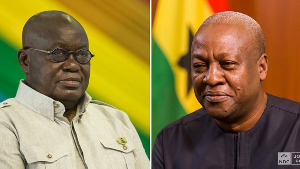 L-R Akufo-Addo and John Mahama
L-R Akufo-Addo and John Mahama
The Flagbearer of the National Democratic Congress (NDC), John Dramani Mahama, has refuted President Nana Addo Dankwa Akufo-Addo’s assertion that the controversial Agyapadie document is fabricated.
Mahama argued that the document, believed to be a master plan of the Akyem faction within the ruling New Patriotic Party (NPP), contains truths contrary to the president’s denial.
He indicated that the state capture of properties by government officials, as mentioned in the Agyapadie document, is evidence that it is not fabricated.
During his campaign tour, Mahama urged Ghanaians to hold the NPP government accountable in the pending 2024 general elections.
“We need to hold this government accountable for the hardship, the crisis that they subjected Ghana to for the state capture that they have implemented in Ghana over the last eight years. Buying every state property, buying all the government lands and amassing wealth to themselves.
"Recently, there was an issue about a document called Agyapadie. They said it's fabricated, but even if it's fabricated, the implementation is not fabricated because everything that is written in that document has been implemented,” he said in a video shared by TV3 on X.
Mahama’s remarks were in response to President Akufo-Addo’s claim, during The Ghana Report Summit in Accra on August 1, 2024, that the Agyapadie document is a fabricated attempt to tarnish his image.
“Today, with a few months to the December 2024 election, they are at it again. A fabricated document entitled Agyapadie is being puzzled around by operatives of the opposition, as evidence of a grand scheme by my party to annex the state, the assets of the state,” Akufo-Addo said.
About the Agyapadie document:
The document, forwarded to the Okyenhene Ofori Panin, outlines plans by the Akyem faction to maintain control of the NPP.
It details various aspects of Ghanaian life that the so-called ‘Akyem Mafia’ intends to dominate, ensuring the country operates under their influence.
The document predicts key events, including changes in leadership at the Social Security and National Insurance Trust, the collapse of indigenous Ghanaian banks, and the positioning of the Okyenhene as the most powerful chieftaincy institution.
It also mentions targeting certain religious figures opposed to the regime, while supporting those in favor.
SB/AE